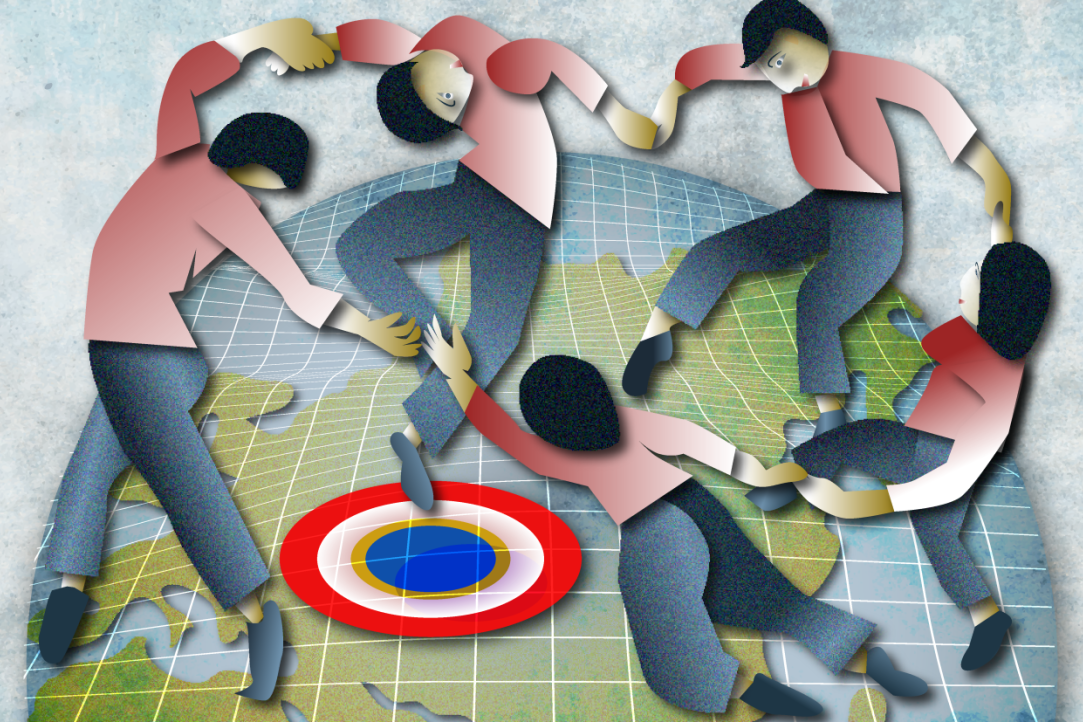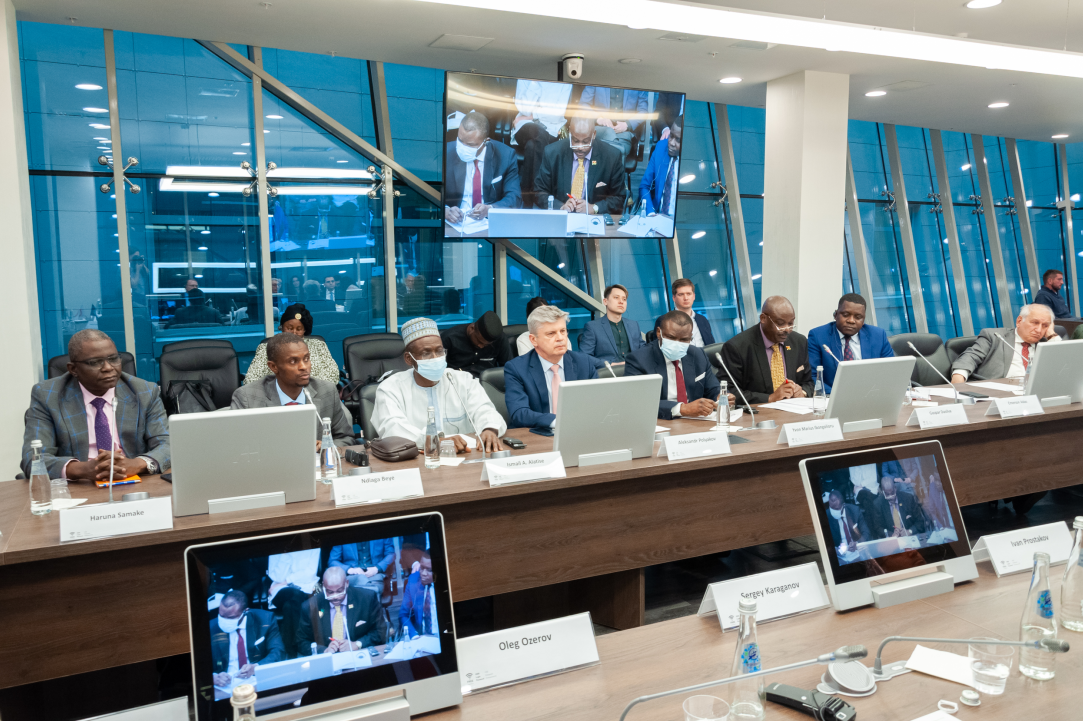Dear colleagues and friends,
Very soon, we will see the start of HSE University’s XXIII Yasin International Academic Conference on Economic and Social Development (formerly known as the April Conference).
The Conference this year is being held for the first time under its brand new name, all while holding on entirely to its longstanding traditions. Now called the Yasin Conference, this is in tribute to Evgeny Yasin, the Honorary Academic Supervisor of HSE University, upon whose initiative the Conference made its first appearance. Under his steady guidance, the Conference has successfully developed for more than 20 years, winning wide recognition both inside and outside of Russia.
This year’s Conference features over 700 papers prepared by experts from 41 countries that will be discussed at around 150 sessions and 24 sections. Furthermore, we have dozens of special and associated events planned, including topic-focused symposiums, roundtables and so forth. We have all the reason to believe that this Conference, much like its predecessors, will be of great significance for Russian academic and social life.
Of course, this year’s Conference will be taking place in the context of difficult and uncertain circumstances, whereby our country and the whole world are experiencing a period of great turbulence. Nevertheless, during times of upheaval, it is important to focus on one’s core values and priorities. With respect to science and education, this means bringing together different perspectives, including people from different countries and backgrounds. For us, maintaining academic unity with a view to upholding our fundamental academic values is the special mission of this year’s Conference.
In addition, we would like to share a few words about the Conference’s format this year. We are using a hybrid approach: some discussions will be held online, while others will be face-to-face. Last year, we had to employ the remote format owing to the Covid-19 pandemic. It proved effective and we are going to do this again, bearing in mind all of the possible difficulties, which may arise for participants from different regions of Russia and around the world.
However, as our many years of experience has shown, the Conference can overcome any challenge, while also remaining highly attractive and fascinating, all thanks to you, our dear and faithful participants!
In closing, it is our hope that we, as friends and peers, will have fascinating and fruitful discourse at the XXIII Yasin Conference on Social and Economic Development!

HSE University Rector,
Chairman, Organizing Committee,
XXIII Yasin International Academic Conference

Academic Supervisor, HSE University
Chairman, Programme Committee,
XXIII Yasin International Academic Conference

President, HSE University
The key events under the 23rd Yasin (April) International Academic Conference on Economic and Social Development (23rd Yasin Conference) will take place in Moscow from April 5 until April 8, 2022. Some events will be held till April 22, 2022.
At sections under the 23rd Yasin Conference, reports will be presented and discussed on the results of recent academic research, selected through reviews of proposals (the requirements for which can be found below). In addition, the Conference will include expert discussions on the most pressing problems in regards to economic and social policies, involving leading Russian and global specialists and public officials, as well as honorary reports presented by academics from all over the world and various associated events. The Conference’s events will be held in Russian or English; certain discussions will be bilingual and supported by simultaneous translation.
Conference Topics
- Arctic Research (special session)
- Demography and Labour Markets
- Digital Economy
- Economic Methodology
- Education
- Financial Institutions, Markets and Payment Systems
- Firms and Markets
- Healthcare Studies
- Instrumental Methods in Economic and Social Studies
- International Relations
- Law in the Digital Age
- Macroeconomics and Macroeconomic Policy
Arctic Research (special session)
The session accepts reports on issues related to the Arctic region, including economic, political, social, and cultural issues. Theoretical models of the Arctic development are also considered. In addition, the problems of the strategic and project management in the Arctic region will be discussed.
Demography and Labour Markets
This section covers a wide range of issues regarding demographic development and trends on the job market. At the sessions on demographic development, we will discuss changes in demographic processes and structures, the socio-economic aspects of demographic trends, population forecasts and models, demographic behaviour, population data sources, regional and national demographics, as well as demographic and migration policy.
At sessions on the job market, we will hold discussions on a wide range of issues concerning employment, unemployment, wage stability and differentiation, inequality on the job market and developing career development institutions. Furthermore, we will look at the impact of digital transformation on the job market.
Particular attention will be paid to the job market and its connection to education, the health of the general population and the challenges driven by the COVID-19 pandemic.
Applications should describe the outcomes of original, primarily economic analysis, although adjacent fields and interdisciplinary analysis are welcome.
Digital Economy
Papers covering various aspects of the digital economy will be accepted for this section, including the following topics:
- digital maturity of economic and social sectors;
- digital transformation of the economy and society, e.g., as applicable to sectors, firms and regions;
- technological trends in digital economics;
- promising business models based on digital technologies;
- assessing the current state of the digital economy and its individual aspects (e.g., development and implementation of AI-based technologies);
- international ratings for digital development;
- assessing the effects of digital technologies;
- state policy in regards to the digital economy;
- digital skills and digital literacy among citizens;
- involvement of the general public in the digital environment and the issue of digital inequality.
Economic Methodology
This section will accept reports examining problems in the methodology of economic sciences, the history of economics sciences in terms of its methodological development, the close links between the economic sciences and economic policy, interdisciplinary research at the intersection of economics and other fields of science. A roundtable in honour of the famed economist Janos Kornai will be held. Both Russian and international experts may take part.
Education
Under the auspices of the "Education" section of the April Conference, two symposiums will be held: Economics, Sociology, Education Policy and Digital Transformation of Education. The first symposium traditionally covers the results of theoretical and empirical studies of education through the prism of economics, sociology and politics. The second symposium addresses the issue that is currently relevant for many researchers and practitioners of education regarding the qualitative changes that have occurred at different levels of the education system in the context of widespread digitalization and the introduction of innovations and new technologies in educational processes.
Financial Institutions, Markets and Payment Systems
The session is devoted to analyzing modern financial institutions, banks, financial and stock markets, as well as payment systems and risk management with respect to the macro and micro aspects of regulation. Furthermore, one key subject of interest would be the influence of innovations on financial intermediation.
Firms and Markets
The session is open to papers on the following topics: corporate governance; corporate finance; the behaviour of firms in markets for goods and services; investment, innovative and organizational behavior; the competitiveness of firms on local and global markets; state-business relations at various levels; market structures; corporate integration; problems of development on regulated markets; ESG practices and corporate performance; firms and markets in a period of the energy transition. Other topics are also welcomed. However papers on marketing, HR management and other managerial issues shall be considered in the “Management” section.
Healthcare Studies
Possible subjects for discussion may include:
• analyzing the factors affecting healthy lifestyles;
•, effective application of resources in health care systems;
• developing organizational, administrative and financial forms for the provision fo medical support;
• comparative analysis of reform processes in the health care systems of Russia and other countries;
• innovation in medical administration;
• impact of changes in organizations; bonus payments and job performance of medical workers;
• costs of medical services; inequality in access to medical support;
•influence of COVID-10 on the provision of medical assistance.
Instrumental Methods in Economic and Social Studies
This section will feature reports on formal methods and Big Data analysis that can be used in the social sciences. Subjects for discussion shall include, but are not limited to, the following topics:
- Big Data analysis in the economy, business and politics;
- support tools for decision-making on the basis of Big Data analysis;
- application of Big Data in economic tasks;
- application of current mathematical methods in economics, business and politics;
- mathematical, imitative and numerical simulations;
- intellectual tools and shells;
- intellectual means of supporting platforms and ecosystems;
- multiple-agent systems;
- modelling socio-technical systems;
- models and methods for administering social networks and network structures;
- big systems monitoring and analysis.
International Relations
The global economy and international political system currently face large-scale changes, which have been caused by accumulated disagreements, unsolved problems in regards to development at both the global and national level, the rise of certain states and the gradual decline of the power of the others. The nature and content of these changes must be the object of thorough and in-depth analysis, which should be conducted at the national and regional level, as well as through a systematic analysis.
The advent on the international arena of new global economic and political actors in Asia and Eurasia, the uncertain dynamics of European development, radical transformations in the US political system and foreign policy all provide new opportunities for testing existing theoretical and methodological approaches, as well as for identifying areas for their improvement. In practical terms, it is crucial to fully examine current global shifts in order for Russia to opt for more suitable and beneficial foreign economic and political strategies.
Macroeconomics and Macroeconomic Policy
This section covers research in macroeconomics, economic development and growth, and considers theoretical or empirical issues. The topics include, but are not limited to:
- monetary and fiscal policies;
- the effects of external and internal shocks;
- the differentiation of countries, sectors and regions by the level and dynamics of production based on an analysis of institutions, geography, international trade and financial markets.
Papers focused on problems of Russia's economy are prioritized. These include research drawing upon modern economic theory and quantitative methods with an emphasis on the analysis of problems facing the Russian economy. The papers also consider other countries and regions with similar problems. Alternatively, they propose theoretical models for analyzing such problems. The latter include:
- support for sustainable economic development amidst the global economic downturn, geopolitical shocks, and the new environmental agenda;
- the dependency on natural resource exports and ways of diversifying the economy;
- the impact of inequality in terms of income and human capital distribution on the economic development among countries and regions.
Management
Papers covering current problems in business & management theory and practice can be submitted to the section. The Management section’s topics are aligned with priority research fields determined by HSE University’s Development Programme for the period until 2030.
Topics of the Management section:
- current trends in management research: new business models and strategies;
- international business in the ‘new’ global economy;
- transformation of HR systems and HR strategies in today’s firms;
- transformation of marketing strategies in the face of the global digital economy;
- cultivating creativity in business;
- managing sustainable corporate development and ESG strategies;
- digital transformation of business: methodology, trends and technologies;
- enhancing production models and operational performance;
- corporate innovation: preconditions, sources and approaches to management.
Network Analysis
Possible topics for this session include:
- network science models and tools for network analysis (e.g., multi-level and complex networks);
- the current gaps in network science methodology;
- creation of network datasets in sociology, management, education, and other fields that focus on currently pressing issues;
- creation of cross-sectional and longitudinal models of networks and behaviour in a variety of disciplines in order to test real and simulated data;
- evaluating the impact of research design on the robustness and resistance of network models;
- developing software applications for new network methodologies;
- other network-related studies.
Political Processes
We welcome applications for presentations, which primarily provide a comparative analysis of political institutions and processes in Russia and other countries (with the application of qualitative and quantitative methods), as well as focus on the use of contemporary methods in computational social sciences in regards to research on political affairs and phenomena.
In addition, we are particularly interested in papers on problems of comparative and global policy, political theory, political behaviour, political culture, political methodological research, etc.
Regional and Urban Development
This session will consider the following topics: territorial development; the extent and dynamics of regional inequality; development of various sectors of economy and social sphere in the regions; regional politics; instruments to stimulate territorial development; relations between the periphery and the centre; budget policies at the subnational level; socio-economic development of cities and agglomerates; housing policy and urban development; urban policy and municipal development management; transformation of agricultural areas.
Law in the Digital Age
The rapid development of digital technologies today is resulting in major changes through all social spheres and state services. Law, as the core instrument for regulating societal relations, must contend with changing conditions, while also facilitating the effective and human-focused implementation of the latest technologies.
In addition to development and changes in the subjects of legal regulation, the emergence of digital technologies means a revolution in legal methodology. The appearance of Big Data and AI systems is helping to generate new outcomes, while also expanding the scope of legal and interdisciplinary research.
Furthermore, these trends have created serious challenges for academics, along with real-life transformation, all of which require in-depth consideration and discussion on the part of legal experts.
At this section, we will discuss the various issues in light of these trends, including the legal frameworks for public/private partnerships in the context of the digital economy, the problems posed by the application of AI as the entire legal system undergoes transformation, the role of lawyers in the digital sphere, IT in academic and practical fields, various issues related to the implementation of digital instruments in specific economic sectors and how this affects regulatory measures.
Science and Innovation
At this section, participants will present their forecasts for technological development and innovation, with a particular focus on developing technological and innovation policies, foresight research methods, assessing and analyzing trends in research and technology, while also considering tools to manage R&D activities and their application.
Social and Cultural Processes
This session will focus on innovative research on the interactions between culture and society. Papers on either the objectified (cultural institutions, rituals, etc.) or subjective (values, identities, etc.) aspects of culture are welcome. Likewise, contributors may apply either quantitative or anthropological methods in their research.
Social and Economic History
The session will discuss research into a great variety of political, economic, social, gender, cultural and other aspects of society in the past. We welcome papers on social mobility, history and memory, social transformation, comparative studies, microhistory, the history of daily and private life, the history of emotions, etc.
Social Policy
Social policy is the most important tool for maintaining social stability, developing human capital, and enhancing its contribution to overall social and economic development. This session is focused on issues related to the level and quality of life of households and social policies with the aim of equalizing the chances of development for various social groups. The most important of these issues are:
1) income, expenses and consumption of households;
2) inequality and poverty;
3) living standards;
3) family economy and policy;
4) social insurance and pension system;
5) social services and nursing care for persons with self-care deficit;
6) social support programmes;
7) transformation and adaption of social policy under both internal and external challenges, including the COVID-19 pandemic.
Sociology
For this session, we plan to gaze through the prism of sociology and related disciplines at social phenomena, processes and practices, both those rooted in the past and the latest contemporary issues.
We welcome papers that consider the dynamics of social institutions, social structures, prospects for social mobility, the connections among educational institutions, the labour market and the economy, trends in progressive social stratification, analysis of social values (both at the societal level and among certain social actors), etc.
Our overall focus shall be on the pragmatism of social relations, segmentation along ethnic, social, economic, cultural, symbolic, digital, gender and other lines underlying inequality.
Pressing issues for this year shall include the social consequences of the Covid-19 pandemic, ethnic conflicts, and the effects of solidarization and mobilization.
Sports Studies
This session will present theoretical and empirical research papers, which deal with economic, social, and managerial problems in the sports industry. Papers on the following topics would be welcome: success factors in sport, league regulation, tournament design, contest theory, development of tournament and match strategies, corruption, betting, spectator demand, financial and social issues of sporting mega-events, scheduling, competitive balance, eSports and other issues.
State and Local Government, and NPO sector
This session will focus on a wide range of issues related to improving public and local administration, as well as the role of non-profit organizations in dealing with issues of socio-economic development. It will also discuss problems related to strategic, programme and project management, administration of public financing, improving regulatory measures, organizing public and municipal services, building connections between state authorities and civil society, and the types and operational methods of non-profit organizations.
Theoretical Economics
The session covers the broad range of ideas in economic theory, including micro- and macroeconomics, industrial organization, political economy, social choice theory and other fields using methods of contemporary economic theory, game theory, decision theory econometrics and related disciplines.
Also, papers will be accepted in such fields as applied economics and experimental economics (e.g., neuroeconomics), which test the predictions of economic theory or explore individual or collective behaviour in regards to various problems and different contexts.
World Economy
This section will include papers on current trends and problems facing the global economy, such as: new developments in international trade, trans-border capital flow and global corporations, international migration of labour force, regional integration and international economic institutions, the energy transition and othertechnological innovation, the key aspects of overcoming the crisis brought on by the COVID-19 pandemic,and the challenges of sustainable development.
Furthermore, participants will discuss the development of national economies around the world and their relationship with global processes, changes in the impact of developing economies on global economic ties, as well as Russia’s role in the global economy.
News





